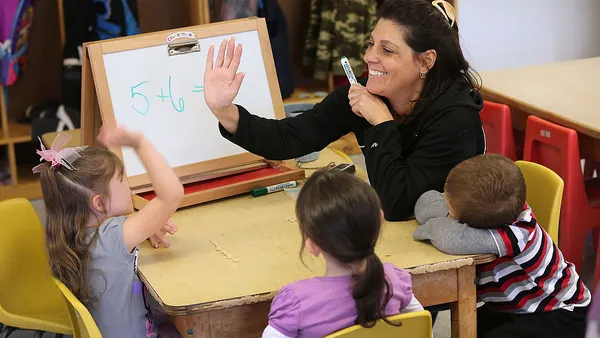Dive Brief:
-
Republican legislators in multiple states have proposed bills that would restrict topics related to gender and sexuality for middle and, in many cases, high school grades. Such bills, referred to by opponents as "Don't Say Gay" laws, in many cases applied only to younger students in prior legislative sessions.
-
Texas, for example, last week advanced a bill that would limit school district employees from providing instruction, guidance, activities or programming related to sexual orientation or gender identity for students in pre-K through 12th grade. The state already allows parents to review instructional materials for all grades.
-
In another case, a Florida sex education bill, SB 1069, would expand through 8th grade existing restrictions on discussion, instruction and policies around gender identity. Restrictions currently cover grades pre-k to 3.
Dive Insight:
Restrictions being considered for higher grades are by no means limited to Florida and Texas. Other states contemplating regulations beyond elementary school around instruction or classroom discussion of gender identity and sexual orientation include:
"We have indeed seen this in other states — in fact, there have been some bills proposed that would apply those restrictions to all grades," said Jeremy Young, senior manager for free expression and education at PEN America, which is tracking state legislation restricting curriculum.
"On average, most of the bills have restricted discussions at higher grades than HB 1557 [Florida's original legislation] did, more in line with what's happening with the new Florida bill this session," said Young.
HB 1557, which was passed in March 2022, restricted “classroom discussion about sexual orientation or gender identity in primary grade levels or in a manner that is not age-appropriate or developmentally appropriate for students.” The bill did not define the terms “age appropriate” or “developmentally appropriate,” similar to other recent bills across the country that would extend restrictions to higher grades.
At the time, then-Florida Rep. Joe Harding, a Republican and co-sponsor of the bill, said it would only apply to students in grades K-3. “The bill is designed to keep school districts from talking about these topics before kids are ready to process them.”
The law gained the attention of the White House and the U.S. Department of Education — and the nation, with heated discussion on both sides. Education Secretary Miguel Cardona denounced Florida's leaders as "prioritizing hateful bills that hurt some of the students most in need."
Catherine Lhamon, assistant secretary for the Office for Civil Rights, also hinted that her office would be active in investigating civil rights cases related to such laws, saying in response to the original "Don't Say Gay" law's passage "we take seriously our charge to fulfill the promise embodied in Federal civil rights laws.”
In a more recent interview, Lhamon highlighted how an uptick in civil rights cases related to LGBTQ issues partially drove a historic increase in OCR cases in 2022.






 Dive Awards
Dive Awards




